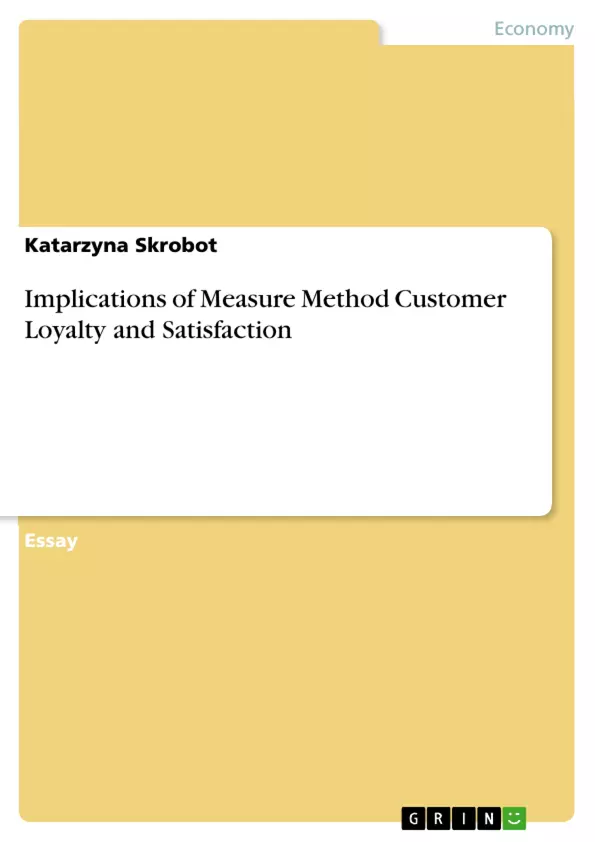Companies are scrambling to boost customer satisfaction and keep their current customers rather than devoting additional resources to chase potential new customers. The claim that it costs five to eight times as much to get new customers than to hold on to old ones is key to understanding the drive toward benchmarking and tracking customer satisfaction.
Measuring customer satisfaction is a relatively new concept to many companies that have been focused exclusively on income statements and balance sheets. Companies now recognize that the new global economy has changed things forever. Increased competition, crowded markets with little product differentiation and years of continual sales growth followed by two decades of flattened sales curves have indicated to today's sharp competitors that their focus must change.
Inhaltsverzeichnis (Table of Contents)
- Introduction
- Customer Loyalty
- Customer Satisfaction
- Measuring Loyalty: A Thorough Approach
- Right Question, Right Way to Measure Loyalty and Satisfaction
- Word of Mouth and Growth Correlation
- NPS Calculator, Does it Work?
Zielsetzung und Themenschwerpunkte (Objectives and Key Themes)
This paper analyzes Frederick Reichheld's (2003) Harvard Business Review article, "The One Number You Need to Grow," examining his approach to measuring customer loyalty and its impact on business growth. The paper explores the relationship between customer loyalty, satisfaction, and profitability, questioning some of Reichheld's assumptions and proposing alternative perspectives.
- Defining customer loyalty and its relationship to growth
- Distinguishing customer loyalty from customer satisfaction and their respective impacts on sales
- Evaluating the effectiveness of Reichheld's proposed measurement methods for customer loyalty
- Analyzing the role of word-of-mouth marketing and customer recommendations in driving growth
- Exploring the challenges of measuring and managing customer loyalty for enhanced profitability.
Zusammenfassung der Kapitel (Chapter Summaries)
Introduction: The introduction sets the stage by quoting Andy Taylor and introducing the central question of how to measure customer loyalty for profitable growth. It highlights the challenges in defining loyalty and the complexities in measuring it accurately.
Customer Loyalty: This section defines customer loyalty as a willingness to invest in a relationship, questioning whether this definition is universally applicable and if it can be transparently measured. It discusses the relationship between loyalty, repeat purchases, and increased customer income, arguing that loyal customers might pay less over time, reducing acquisition costs for the company.
Customer Satisfaction: This section analyzes the relationship between customer satisfaction and sales growth, using the example of car manufacturers to illustrate that customer satisfaction alone may not correlate directly with profitability. It explores the cost implications of serving loyal but dissatisfied customers and vice-versa.
Measuring Loyalty: A Thorough Approach: This section critically examines Reichheld's proposed methods for measuring customer loyalty. It discusses his one-question survey approach and the Net Promoter Score (NPS) calculation, focusing on its potential for providing quick data correlating with growth. The chapter also points out shortcomings in Reichheld's approach.
Schlüsselwörter (Keywords)
Customer loyalty, customer satisfaction, Net Promoter Score (NPS), word-of-mouth marketing, profitable growth, customer behavior, measuring loyalty, repeat purchases, customer acquisition cost, business success.
Frequently Asked Questions
What is the "One Number You Need to Grow" according to Reichheld?
It refers to the Net Promoter Score (NPS), based on the single question of whether a customer would recommend a company to a friend or colleague.
How does customer loyalty differ from customer satisfaction?
Satisfaction is a measure of past experience, while loyalty is a willingness to invest in a future relationship and actively recommend the brand.
Why is it cheaper to keep old customers than to get new ones?
Acquiring new customers costs five to eight times more due to marketing and acquisition expenses, whereas loyal customers have lower service costs and higher lifetime value.
Does customer satisfaction always lead to sales growth?
Not necessarily. The paper uses car manufacturers to show that high satisfaction scores don't always correlate directly with profitability if loyalty is absent.
What are the challenges of the NPS calculator?
The paper questions the simplicity of the approach and explores whether one single number can truly capture the complexity of customer behavior and business growth.
- Arbeit zitieren
- Katarzyna Skrobot (Autor:in), 2009, Implications of Measure Method Customer Loyalty and Satisfaction, München, GRIN Verlag, https://www.grin.com/document/183577



